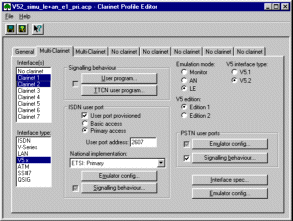|
|
|
Clarinet V5 application
Presentation
The Clarinet-system is a powerful Protocol Test
platform supporting V5 interfaces and protocols. It offers a wide
variety of functions:
- Monitoring
- Automatic simulation
- Conformance testing for Layer 2 and Layer
3 of V5.1 and V5.2 protocols based on
ETSI test suites
|

Large snapshot
|
V5
|
Monitor |
Emulation |
Executable
Test Suites |
C-Programs
Simulation |
Built-in
Simulation |
| V5.1-Data Link |
x |
x |
ETSI
300324-8 |
x |
x |
| V5.1-Network |
x |
x |
ETSI
300324-4
300324-6 |
x |
x |
| V5.2-Data Link |
x |
x |
ETSI
300347-8 |
x |
x |
| V5.2-Network |
x |
x |
ETSI
300347-4
300347-6 |
x |
x |
The flexibility and user-friendly
interface of the software provides the user with a way to use it for
product development, engineering, or field trials. |
Standard features
Interface connection
Analysis Functions
Emulation functions
Signaling simulation
Programmable simulation
Conformance testing simulation
Clarinet-system: basic configuration
Physical Interface
- One to Seven E1 Links (75 or 120 Ohms)
Interface Management
Simultaneous management of groups of E1 interfaces:
- PH-physical interface
- C-channels on Links 1 to 7 (2 per Link:
TS16+15)
- Bearer channels on Link 1 to 7 (source:
all Loops +1 handset).
Protocol Event Generation
- Physical level: E1 alarms.
- C channels: HDLC frames.
Statistics Event Generation
- BOP type event counters on C Channels.
- Data-flow counters on BOP link at
different protocol layers.
Protocol Specification for Display
- Physical Link: E1 ITU recommendations G703, G704.
- C channels:
- BOP envelope ,
- V5 protocol stack: V5 EF, V5 Data Link, V5 Network
- ISDN Q921, Q931
V5 Automatic Simulation
- Interface
specification
- 1 to 7 E1 Links
- 1 ISDN port (BRI or PRI) and 100 PSTN
ports simulation
- Protection, Control, Link Control, BCC, PSTN, ISDN
- Automatic simulation over 100 PSTN ports and 1 ISDN port
- Manual commands: send primitives applying to
each ISDN/PSTN port, E1 Link (blocking,
unblocking)
PSTN Automatic Simulation:
Behavior of
each of the 100 ports: generator and/or
responder.
- Outgoing and incoming communications
defined by a common specification:
- IE buffer for SIGNAL, ESTABLISH,
DISCONNECT messages.
- Conditions on incoming events
- Delays
- Independent outgoing communications
defined by:
- Delays and digits for SIGNAL
messages.
- Number of repetitions and
inter-communications delay.
- Automatic digits sending
- Manual commands: CALL, CLEAR, CLEAR ALL
Q931 Automatic Simulation:
One ISDN BRI / PRI port
Behavior:
generator (1 to 32 outgoing SETUP’s) and/or
responder (acceptance, 30 incoming SETUP’s).
- Independent outgoing communications
defined by:
- Delays and IE buffer for SETUP,
INFOS, RELEASE.
- Number of repetitions and
inter-communications delay.
- B channel establish and active
source.
- Identical incoming communications defined
by:
- ACCEPT/REJECT behavior.
- Transmission option and IE buffer
for response messages
- Delay before CONNECT.
- Establish and active source of
the B channel:
- Manual commands: CALL, CLEAR, INFO,
RESTART,
Physical Layer
- Emulation mode: AN or LE
- Protocol mode: V5.1 and V5.2,
V5 Link Layer
- Setting of Parameters (time-limits, numbering)
V5 Network Layer:
- Selection of ETSI specification (Ed1/ Ed2)
- Start-up procedure configuration and V5.1
channels allocation
- Setting of Parameters (time-limits, numbering...)
PSTN Network Layer
- PSTN port provisioning,
addressing
ISDN Link Layer: Q921
- SAPI 0,16 and 63 initialization
- Setting of Parameters (time-limits, numbering)
ISDN Network Layer: Q931
- Selection of national variants (ETSI, NI2,ATT...)
- Setting of Parameters (time-limits, numbering...)
API
- Use of CLARINET-Development C language
- Microsoft format library.
- Level N simulation using emulation on signaling channel.
ETS
- The V5.1&V5.2 pr(I)ETS define V5-serie signaling protocol for:
- LE equipment applying to Link
Layer or Network Layer.
- AN equipment applying to Link
Layer or Network Layer.
- These ETS products include the Executable
Test Suites corresponding to a set of
ETSI standards covering the V5-serie
protocol specification. ETS packages result from
compilation with Clarinet TTCN compiler.
- V5.1 protocol specifications ETS
300 324-1 (Edition 1 and 2)
- V5.2 protocol specifications ETS
300 347-1 (Edition 1 and 2)
- Template of profiles, PICS/PIXIT
- Execution under Clarinet Run-time
ATS
- The Clarinet TTCN compiler and the stack of emulators allow the users to develop
or customize new ETS.
Qty.
|
Refer.
|
Product Designation
|
1-4
|
2001
|
Clarinet-Book USB E1/T1
|
1
|
8001
|
Clarinet-Run-time
|
Clarinet-System: V5 Options
1
|
8791
|
Clarinet-ETS-V5.1
- ETSI 300324-8 Data Link Layer
|
1
|
8792
|
Clarinet-ETS-V5.1
- ETSI 300324-6 Network Link LE-side
|
1
|
8793
|
Clarinet-ETS-V5.1
- ETSI 300324-4 Network Link AN-side
|
1
|
8592
|
Clarinet-ETS-V5.1
- ETSI 300324-6Ed2 Network Link LE-side
|
1
|
8593
|
Clarinet-ETS-V5.1
- ETSI 300324-4Ed2 Network Link AN-side
|
1
|
8794
|
Clarinet-ETS-V5.2
- ETSI 300347-8 Data Link Layer
|
1
|
8795
|
Clarinet-ETS-V5.2
- ETSI 300347-6 Network Link LE-side
|
1
|
8796
|
Clarinet-ETS-V5.2
- ETSI 300347-4 Network Link AN-side
|
1
|
8797
|
Clarinet-ETS-V5.2
- ETSI 300347-6Ed2 Network Link LE-side
|
1
|
8798
|
Clarinet-ETS-V5.2
- ETSI 300347-4Ed2 Network Link AN-side
|
|
